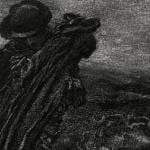 The Oracle of Delphi commanded “know thyself,” but this meant merely to consider our smallness next to the great god Apollo and our ignorance compared to the wisdom of the Oracle. Socrates transformed this aphorism, not to the self-help of the intellectually shallow guru of self-esteem, but to a command to dialectic. The dialectic is the process of questioning everything and moving tentatively from one provisional answer to another until seeing the Known Unknown.
The Oracle of Delphi commanded “know thyself,” but this meant merely to consider our smallness next to the great god Apollo and our ignorance compared to the wisdom of the Oracle. Socrates transformed this aphorism, not to the self-help of the intellectually shallow guru of self-esteem, but to a command to dialectic. The dialectic is the process of questioning everything and moving tentatively from one provisional answer to another until seeing the Known Unknown.
Education must contain the dialectic or the process will degenerate into the repetition of socially received or politically approved platitudes. Even truths can become an intellectual trap if those truths do not generate new questions, wonder, or resist all challenge. The truth must never be forced into an ideology: an intellectual system so comprehensive that all questions are answered and all learning from outside systems is precluded.
Socrates built on ideas from the pre-Socratics like Heraclitus. While looking for the “beginning,” the unifying pattern that undergirds the world, Heraclitus found a divine logos: reason or word. He resisted the idols of his age, because they were merely reflections of humankind in all our fallibility. Man fails when he tries to make gods in his image. Instead, Heraclitus looked to a divine that was nothing like man, someone adequate to be the ground of the cosmos.
Socrates (or at least Plato’s Socrates) left us the dialectic, but his student Plato gave us worldview: Platonism. This was not an ideology as Platonism has learned from critics, spawning several competing versions (eg. Theistic or non-theist Platonism). Instead, this school of thought was an excellent preparation for the Revelation of God to man in the person of Jesus Christ.
In Book VII of Republic, Plato begins a discussion of education where humanity, trapped in a cave of ignorance and delusion, might be set free by the power of dialectic to see the truth. Once one sees the True Light, no flickering fire built by puppet masters and ideologues can satisfy. The trouble for Plato was that he had no means to deliver the first person from the cave. We had to save ourselves educationally, but there was no mechanism to do so.
And then Christmas came: the World became flesh and dwelt amongst us and we could behold his Glory, full of grace and truth.
Nobody, not even Heraclitus or Plato, anticipated that the Divine Logos, the Mind that created the logic that undergirds the world, would come as a man. When Paul came to Athens (as recorded in Acts 17), he answered many religious and philosophical questions when he introduced the God/man, Jesus: dead, yet risen.
Plato had given us the myth of Er, the man who died and came back from the dead to report that there is cosmic justice. In the very last lines of the Republic, Paul gave the neoPlatonist of Athens a better story: myth made history.
The implications for education were obvious: the Word revealed grace and truth. The growth of the soul in a child or adult was not one thing, grace or truth, but both aspects. The dialectic was not lost, Athens and Jerusalem were in dialog. Athens gave the gift of the dialectic and many ideas; Jerusalem, the revelation of the the God/man.
How to understand this? The image of the Eastern double-headed Eagle is a beautiful window to this truth. This Christian ideal can see Athens and Jerusalem eternally united in one body. Education keeps grace and truth in tension, but without total separation. The two heads on one body dialog with each other: one urging grace, the other truth. The dialectic and truth (orthodoxy) dialog, but with essential unity.
Education cannot be reduced to Athens or to Jerusalem, grace alone or truth alone, reason or revelation. The attempt to remove the tension is, as we shall see, to leave true education and move to some sterile ideology.
For this reason, Orthodoxy both created wholistic eduction. Only true Orthodoxy can sustain it, and only Orthodoxy has the deep story of education that can save us from ideologically driven reductionism.













